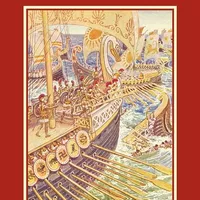50. Julius Caesar
"Veni, vidi, vici"—"I came, I saw, I conquered." —CÆSAR.
Let us take a look at this Cæsar, whose name and deeds are talked of still, though nearly two thousand years have rolled away, since he lived and died in far-off Rome. He was now growing up, in his father's house, a tall handsome youth, with dark piercing eyes, a sallow face, somewhat thick lips, and a high forehead. As quite a young boy, he must have seen and heard much, about his country. He must have known well, his uncle Marius, who was a great soldier and did much for Rome, till he was exiled in disgrace, by those he had tried to serve. Sulla, the rival of Marius, he knew well too, for had not this powerful Dictator uttered the ominous words—"I charge you to look after this youth with the loose girdle, for in this young Cæsar, there is many a Marius"? Having incurred Sulla's wrath, Cæsar joined the Roman army and left Italy. He distinguished himself in the field, both in Asia and in Spain, and returned to Rome to find the work of his life.
He was now a marked man; he had spoken in the Senate; he had been consul; he had pleaded in favour of the appointment of Pompey to his high commands, and Pompey had married his daughter Julia. It was to him the Romans now looked, to rid them of a great danger, which threatened them in the north. Gaul and Germany were once more in a state of great unrest, and might at any time let loose their wild armies, in the plains of North Italy. Cæsar was forty-two, when he left Rome to take up his military command in Gaul.
As a younger man, reading the life of Alexander the Great, he had burst into tears, and on being asked the reason he had answered, "Do you not think I have just cause to weep, when I consider that Alexander at my age, had conquered so many nations, and I have all this time done nothing that is memorable?" He was yet to make himself a name as great, if not greater, than his hero. To subdue these restless tribes beyond the Alps—the country we now know as Switzerland, France, and Germany—was Cæsar's object in life, and to establish the power of Rome over them. New countries, undreamt of by Rome, were now discovered, by the ever-advancing army under Cæsar. Across the great German Rhine, and over the French Seine, he passed, conquering and subduing the fierce tribes, which fell back before the trained Roman legions, under their great commander. Arrived at the north of France, Cæsar looked across the Channel from Calais and saw the white cliffs on the English coast.
No one could tell him anything of that country, so, one calm evening, he sailed from the coast of France, and morning found him off the coast of Dover. The white cliffs were lined with painted warriors, waving lances, and ready to hurl large stones into Cæsar's ship, if he attempted to land. Calling his officers round him, while his fleet collected, he ordered them to move along the coast with the tide. The Britons followed by the cliffs, scrambling along with their cars and horses. It was evident they meant to oppose any landing.
Cæsar anchored near the shore, but the water was up to the shoulders of the Roman soldiers. Then an officer sprang into the sea, waving the standard of the Roman eagle, and cried to his men to follow. With a great cheer the men sprang overboard. The Britons rode their horses into the waves and for a time stopped their progress, but the Romans managed to land and the Britons galloped away. Some sharp fighting took place on land, but the wild tribes were no match for the Romans.
It was now nine years since Cæsar had left Rome. Now he had made a name indeed for himself. He was returning to lay at his country's feet, a province larger than Spain, new lands of which the Romans had never heard, warriors devoted to himself, and a detailed history of all his doings. His countrymen had watched his career steadily. The Senate had listened to every story of his marches and battles, his perils and victories, as they were recited one by one.
"Cæsar has not only repulsed the Gauls, he has conquered them," cried Cicero, one of the greatest of Romans. "The Alps were once the barrier between Italy and the barbarians; the gods placed them there, for that very purpose—to shelter Rome in the weakness of her infancy. Now let them sink and welcome; from the Alps to the ocean she has no enemy to fear." But there was one man in Rome who watched Cæsar's growing power with dismay. It was Pompey, now consul of Rome. He dreaded the return and triumph of this great conqueror, whose name was on every lip, of whose genius none could speak too highly. The return of Cæsar would mean the fall of Pompey, for Cæsar had been promised the consulship. The state of Rome was very corrupt at this time. Men were afraid of offending Pompey; they were yet more afraid of Cæsar, with his legions in the north. Day by day matters grew worse; was it to be peace or war?
The answer was not long in coming. It was war.

